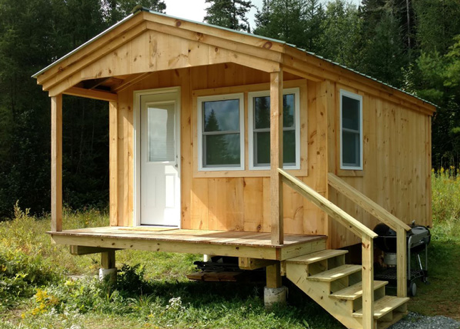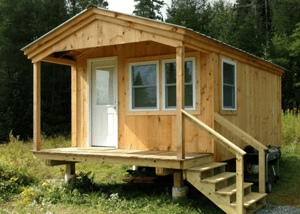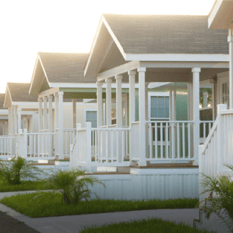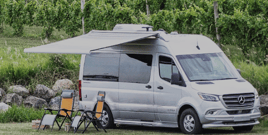
The year is 2030: ten years since the 2020-2021 COVID-19 pandemic forever changed how people used work and home spaces. Housing and office trends accelerated towards a new work/life balance that has improved the home, office, and financial freedoms of all working classes ever since….
The Work Cottage
You are in a “work cottage”. It’s a fully equipped and wired 150-square-foot detached building in your suburban backyard. It cost $5,000 to install, which your company paid for, because they have reduced their  office space to only a meeting space, and they have a corporate relationship with a Work Cottage company that builds work cottages for employees who don’t have an office in their primary home space. If you leave your job, the work cottage will be disassembled and taken to another employee’s house for them to work out of.
office space to only a meeting space, and they have a corporate relationship with a Work Cottage company that builds work cottages for employees who don’t have an office in their primary home space. If you leave your job, the work cottage will be disassembled and taken to another employee’s house for them to work out of.
If you freelance, no problem. You would just simply order one from Amazon.
.jpg?width=247&name=10_05407e6e-cf74-43d7-adfe-60a852924245_1728x%20(1).jpg)
You have a sound-proof home telephone booth purpose-built to take video calls in, which you keep in your basement. Your company rents these and offers to have them installed in employees’ homes if they request it for quiet video calls.
Your former office building in the city is now a rent-controlled condo for first responders.
Down Sized
Although your family has grown, your home is smaller than it was ten years ago.

You don’t live in a tiny house, but you don’t live in a costly, big house with useless rooms and high taxes. You live in something like Wee Cottage, and rent hotels and houses anytime your family wants to spread out and have a change of scenery. Of course, you all work and take school classes from anywhere, so this is an easy option.
Work to Live
You are paid based on output, not based on time. Your kids left for school at 8:30am and they will return at 3pm. So, you will only work until 3pm.
Your company and their Wall Street shareholders are happy with investing in a profitable, sustainable company that doesn’t need hyper-growth or office workers to offer a good return.
You attend only 3 work meetings a week, instead of 20. So now, you put your laptop down and get your kids when they need you, without shame or explanation.
Real Estate in the Tech Era
Your husband lost his teaching job and you need to move from a rural suburb to a small city in order for him to work again. Neither of you are worried about selling your home, however bad the local economy. In fact, you don’t even list your house on Zillow for cheap buyers to lowball you – no, you sell your house directly to a real estate tech broker the next day, and you move a week later, cash in hand.
A real estate agent assisted with all of the moving pieces and got paid 2% for being a “home concierge”. All of the services in your life were easily migrated over by MyMove.com, which specializes in porting your personal life - like your address, your cable, your voting registration, and your insurance - with just a few clicks.
You buy a new home on your phone, based on the augmented reality tour you took, which was exactly like the real thing but without any hassle. If you don’t like the home, you will have a 90-day out-clause and can give it back to the technology company that sold it to you.
Working Remotely, Anywhere
You have flown 50,000 miles the past year. But not for work. You sold a 1/6 fraction of your home equity to a real estate FinTech startup, and you use these funds to travel the world while you work remotely. Your children’s school offers remote and homeschool options to keep pace. Standardized testing has gratefully been retired, so kids are learning crafts and reading assignments which will prepare them to be entrepreneurs or vocational experts by 2040.
The City-Hopper
You wake up in a major city in an apartment room that you found on an app. Your furniture is rented from the top brands that you could never afford if you purchased them. You head to the office center in your condo building, where you co-work until lunch. After lunch you head to a shared space your company rents to meet with three colleagues in a conference room with a digital whiteboard that broadcasts to colleagues around the country.
You decide that because you are working on a 30-day project, you will move into a curated hotel/apartment hybrid in Dublin for that 30-day period, work from there, and return after. You will lease out your room in your apartment to another person city-hopping.
The World as your Home
It’s not a trailer park, it’s a manufactured home community. And you live in one, along with dozens of other  young people who have re-imagined what it means to live in extremely affordable and functional neighborhoods close to nature and away from cities, in close-knit communities of campers and digital nomads. 20% of the country lives in them already, and they are not for low-income people, they are for everyone, because they are beautiful, safe, and affordable.
young people who have re-imagined what it means to live in extremely affordable and functional neighborhoods close to nature and away from cities, in close-knit communities of campers and digital nomads. 20% of the country lives in them already, and they are not for low-income people, they are for everyone, because they are beautiful, safe, and affordable.
After all, you and your girlfriend both just got virtual jobs with Amazon. You bought a $161,000 Mercedes Sprinter Van complete with a full satellite WIFI connection and will do your jobs from the road when not in your mobile home community.

If this works out, you will charter the van out and buy a satellite equipped sailboat and live on it.It will be your primary home, while you rent apartments, hotels, and homes around the world on-demand based on where your profession, education, and family take you.

Your home won’t be a place, it will be the world, and you will look back on your 10 hours of weekly commuting, 20 office meetings,
high taxes, and bad jobs as an antiquated real estate era of costly homes and unnecessary office life.
LEARN MORE about Audience Town's PropTech marketing solutions.